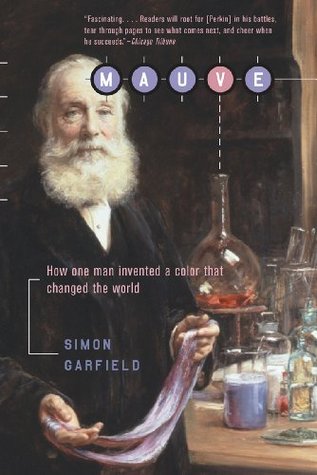
Today's post is on Mauve: How One Man
Invented a Color that Changed the World
by Simon Garfield. It is 222 pages including an index and it is
published by W. W. Norton & Company. The cover is an oil painting
of Sir William Perkins. The intended reader is someone who likes
science, history, and surprising inventions. There is no language, no
sex, and no violence in this book. The story is told in two ways; the
past is from the third person perspective with letters and other
first hand documents added in for development, and the present Garfield
writes from first person as he interviews people. There Be Spoilers
Ahead.
From
the dust jacket-
Born of an experimental slip, this odd shade of purple revolutionized
the worlds of fashion, industry, and chemical research.
Mauve
is the story of a man who accidentally invented a color, and in the
process transformed the world around him. Before 1856, the color in
our lives- the reds, blues, and blacks of clothing, paint, print- came
from insects or mollusks, roots or leaves, and dyeing was painstaking
and expensive. But in 1856 eighteen-year-old English chemist William
Perkin accidentally discovered a way to mass-produce color in a
factory.Working on a treatment for malaria in his London home laboratory, Perkin found mauve by chance. His experiments failed to result in artificial quinine as he had hoped, but produced instead a dark oily sludge that happened to turn silk a beautiful light purple. Mauve became the most desirable shade in the fashion houses of Paris and London, and quickly led to crimsons, violets, blues, and greens, earning its inventor a fortune. But its importance extends far beyond ballgowns.
Before mauve, chemistry was largely a theoretical science. Perkin's discovery sparked new interest in industrial applications of chemistry research, which later bought about the development of explosives, perfume, photography, modern medicine, and today's plastics industry.
Perkin is honored with the odd plaque and bust in colleges and chemistry clubs, but is otherwise forgotten man. With great wit, savvy, and historical scope, Simon Garfield delivers a fascinating tale of how this accidental genius set in motion and extraordinary scientific leap.
Review- This is why I love Garfield so much. This book is interesting, funny, moving, and very well written. Garfield takes something that I knew next to nothing about and does all that with it. Garfield is a wonderful writer. He makes the very technical world of chemistry and makes it readable. In addition to uncovering Perkin and his discoveries, he interviews people in the different industries that were affected by his work. Going from birth to his death Garfield then goes beyond Perkin into the future that he helped create. The way that Garfield blends the past and the present to make one story is brilliant and just like him. I love the way that he makes the subjects of his books so normal by showing how it intercedes with our own lives.
I
give this book a Five out of Five stars. I get nothing for my review
and I borrowed this book from my local library.
No comments:
Post a Comment